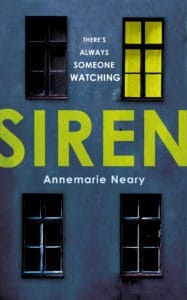Books
Dear Reader: a letter from Annemarie Neary
Dear Reader,
Two girls go dancing. By the end of the night, two off-duty soldiers are dead.
During the Northern Ireland Troubles, female killers were rare, honey traps rarer still. This story was so perplexing that I can still remember exactly where I was when I heard it — in the hallway of my parents’ house, about to leave for school.
Decades on, that story became the spark for Siren. My invented version focuses on Róisín — the sap, the girl who didn’t realise what was going to happen, though she should have done. She really should.
Siren is about guilt and redemption, and the lies we tell ourselves about who we really are. The novel opens with a glimpse into the dark heart of the story, when we encounter the brutal Brian Lonergan in the immediate aftermath of the honey trap he has engineered and which sets Róisín’s life off course.
 From that night in Belfast, the narrative is wrenched forward more than twenty years. The next time we meet Róisín, she is returning to Ireland from her home in New York to corner Lonergan, now a rising politician with a wiped-clean past, at his holiday home on Lamb Island. Our first sight of the adult Róisín is through the eyes of Boyle, whose job it is to get rid of her.
From that night in Belfast, the narrative is wrenched forward more than twenty years. The next time we meet Róisín, she is returning to Ireland from her home in New York to corner Lonergan, now a rising politician with a wiped-clean past, at his holiday home on Lamb Island. Our first sight of the adult Róisín is through the eyes of Boyle, whose job it is to get rid of her.
This Róisín is a very different proposition from the naïve schoolgirl in Belfast. She has worked hard at reinvention but, in the wake of divorce and bereavement, her new life is beginning to unravel and old traumas are resurfacing. With scandal threatening Lonergan’s career, Róisín arrives on Lamb with a demand to make of him, in the knowledge that she has the evidence to bring him down if she chooses.
Siren is told from the alternating points of view of Róisín and Boyle. A major challenge in writing the book was attempting to get inside Boyle’s psyche. Like Róisín, he is an outsider, someone who feels the world no longer has a place for him. But in his case, isolation has fed his fantasies.
An art school dropout and former commune leader, Boyle squats in the island’s abandoned school and ekes out a living from handouts and from doing odd jobs for the likes of Lonergan. He is persona non grata on the island, a loner and a peeping Tom, sexually frustrated and unpredictable. When Lonergan gives him the job of planting various items around Róisín’s house to frighten her off, Boyle’s fascination soon develops into obsession.
In the Lamb Island sections, I wanted to create a sense of vulnerability and menace, so location is key. Lamb Island not a real place, not exactly, but it is closely modeled on the islands of West Cork, in Roaringwater Bay and beyond.
I’ve spent a lot of time on boats in those waters during brief, unreliable summers. I’ve wild-camped on the lush uneven grass on several of the islands and sheltered from sudden gales in the roofless shells of buildings that, until the ‘50s or so, would have housed the last remaining island families.
Many of those islands are named for animals – there is a Goat, a Horse, a Hare, three Calves. So why not a Lamb? For my island, I stole most of the geography from the most beautiful of them all, a wild, dramatic and sometimes bleak place, and the most southerly Irish island, Cape Clear.
There is an enduring attraction for the crime writer in islands — from Agatha Christie’s And Then There Were None to Peter May’s most recent novel, Coffin Road, set on Harris. It is the fascination of the locked room, the place that shuts down when the last ferry leaves.
When I visited Cape Clear, I knew that I had found a home for Boyle, and the ideal landscape in which to play out the endgame between Róisín and Lonergan.
Annemarie Neary


Please note: Moderation is enabled and may delay your comment being posted. There is no need to resubmit your comment. By posting a comment you are agreeing to the website Terms of Use.